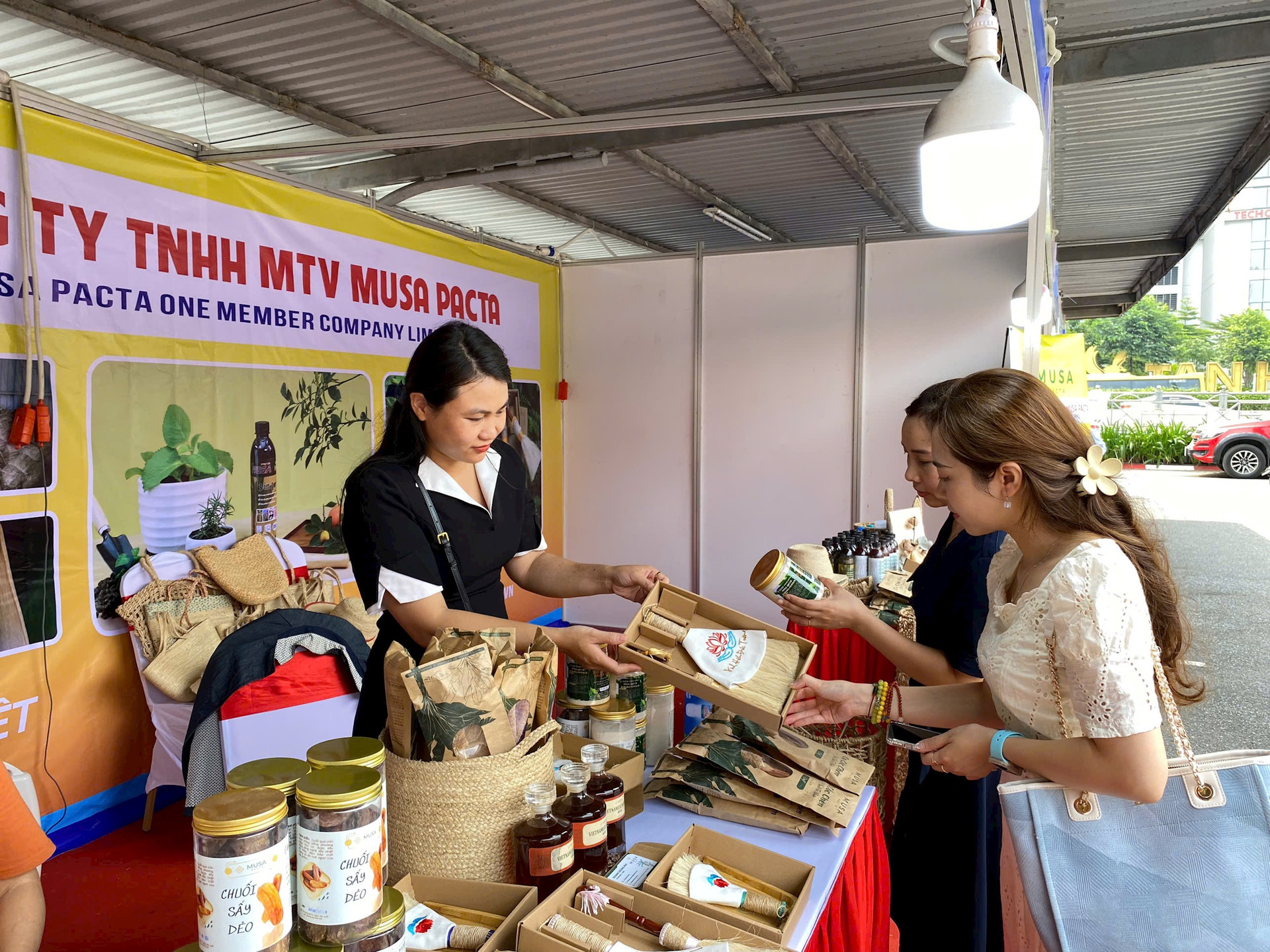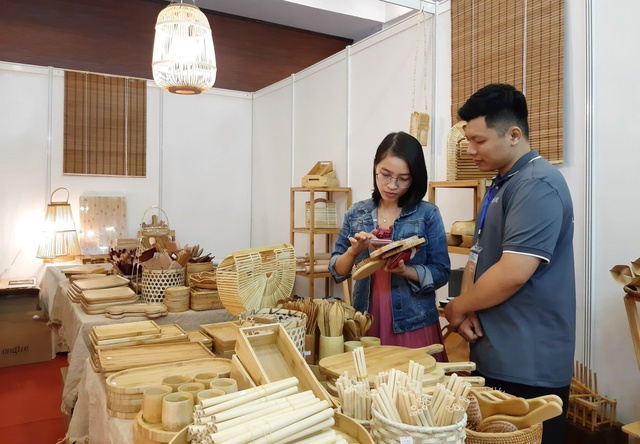Hanoi businesses adopt green practices as consumer demand grows
The city launches an initiative to create long-term partnerships between retailers and green product suppliers.
Given the surge in demand for environmentally friendly products, many Vietnamese shoppers have embraced "green" channels with a sense to protect their health and the planet. However, the link between "green" consumption and production still faces challenges, revealing gaps in community awareness and corporate social responsibility that need to be addressed, according to local insiders.
Hoang Minh Lam, Director of the Hanoi Center for Industrial Promotion and Industrial Development Consulting, highlighted that "green" consumption is a key pillar of the National Strategy for Green Growth for 2021-2030, with a view to 2050.
| Local consumers make their purchases at an event dedicated to green and sustainable consumption. Photo: Hanoimoi Newspaper |
He added that sustainable production and consumption represent a transformative journey toward maximizing resource and energy efficiency. This transformation includes the use of renewable materials and energy, the promotion of environmentally friendly products, and a commitment to minimize, reuse, and recycle waste.
"It also underscores the need to preserve ecosystems at every stage of a product's lifecycle - from raw material extraction to production, distribution, consumption, and disposal," he emphasized.
Green consumption drives business transformation
Nhan Sy Nguyen, sales manager of the Hanoi branch of TQT Packaging Co., Ltd. which specializes in manufacturing, designing, and printing a variety of paperboard products, cartons, and shipping boxes, emphasized, "In line with the trend of green and sustainable development, we have made a bold move to switch to environmentally friendly, highly biodegradable materials, including alternatives to traditional plastics and nylon.
He explained that while the price of paperboard products is generally a bit higher than conventional options, the company remains committed to the business for the sake of long-term sustainability. Customers and partners are also evolving and increasingly prioritizing environmentally friendly paper products, he said.
"The company is actively upgrading its machinery, implementing new technologies, and cutting costs to make eco-friendly products more affordable and competitive. Green consumption will become a major trend in the future," he said.
Bui Khanh Dung, CEO of MUSA PACTA, emphasized that the Net Zero movement and emerging green trends represent major global shifts, not just passing fads. As a result, many companies are focusing on models that create and market environmentally friendly products, attracting a wave of innovative young startups.
Showcasing the eco-friendly products made from banana plants, Dung noted that farmers often discard banana stalks after harvest or use them solely for animal feed.
"However, we have turned these discarded plants into valuable resources to produce a variety of papers, banana fiber, banana flour, handicrafts (such as office decorations), and even nutrient-rich water for crops," he said.
The company's offerings extend beyond the domestic market to international shores such as the EU, G7 countries, and Dubai. In response to the Covid-19 pandemic, MUSA has pivoted to focus on direct retail through e-commerce and the local market.
Alongside its Hanoi factory, the company is expanding its horizons by developing organic production areas and building closed-loop, circular production facilities in Lao Cai, Hai Duong, and Thanh Hoa.
Collaborative campaign to promote environmentally responsible consumer practices
| The demand for green consumption in Hanoi is growing by the day. Photo: Thuy Linh/ The Hanoi Times |
To encourage a culture of sustainability, the Hanoi Department of Industry and Trade has recently teamed up with a number of organizations to launch a campaign on the promotion of green and sustainable consumption. This initiative aims to forge long-term partnerships between retailers and suppliers of eco-friendly products.
These efforts open new avenues for business collaboration, integrating production and value chains in ways that enhance trade and consumer practices while ensuring social welfare.
The program demonstrates Hanoi's commitment to supporting and encouraging businesses that create biodegradable, reusable, and environmentally friendly products, all in pursuit of sustainable development and a thriving green economy in the capital, the department said.
The event also underscores the city's commitment to working with residents to promote sustainable production and consumption, maximize resource use, and minimize pollution.
A representative of Central Retail Vietnam, which owns the Go! Big C and Tops Market chains, announced that the company is at the forefront of green and sustainable retailing. Its ambitious goals include reducing greenhouse gas emissions, supporting local communities, promoting eco-friendly packaging, and addressing waste management.
In 2024, they plan to roll out recycling collection machines at GO! malls across the country, inspiring customers to live a zero-waste, green lifestyle and actively contributing to a circular economy.
He added that each year, the supermarket network partners with various organizations to launch dynamic initiatives aimed at reducing plastic bag use and plastic waste. This campaign encourages shoppers to take charge of their impact by bringing their own bags or reusing eco-friendly alternatives, driving the movement to combat plastic pollution in Hanoi.













